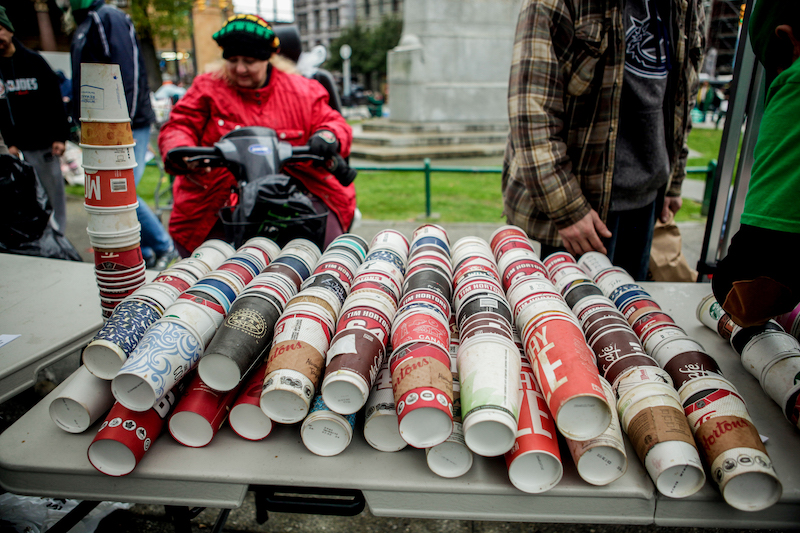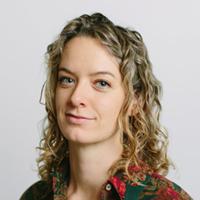Vancouver has a serious cup problem.
We use and throw away 2.6 million cups, paper and plastic, a week. That’s more than four cups per city resident.
To increase awareness and reduce consumption, Vancouver launched the Single-Use Item Reduction Strategy last year. It includes plans to reduce the use of cups, take-out containers, plastic and paper bags, straws and cutlery.
These items take up over half of the space in public waste bins and cost taxpayers $2.5 million per year to collect as litter or sort from bins — with cups alone making up 22 per cent of the litter in Vancouver.
The city’s action plan to reduce the use of these products, cut collection costs and divert cups from the landfill sounds promising, but falls a little flat in execution. Currently, the city can’t even compost the cups in the green bins.
The efforts are all part of a messy experiment in what does and doesn’t work, Spencer Viehweger told The Tyee. He’s the president and co-founder of Matchstick, a local cafe soon opening its fifth location in the city.
Matchstick charges 25 cents more for each drink sold in a disposable cup, effectively offering a break for customers who use the cafe’s ceramic mugs or bring reusable mugs, said Viehweger. Each location sells around 75,000 cups per year and uses the extra $18,750 raised to invest in more environmentally friendly options, such as subsidizing a dairy-free milk alternative and buying carbon offsets, he said.
Currently the city has no rules around what businesses need to do with extra income raised from cup sales.
The city’s plan includes passing a bylaw requiring businesses to keep track of how many cups they distribute and come up with a plan to reduce the number. And it suggests requiring businesses to charge for all disposable cups, with a uniform fee still being debated.
Viehweger disagrees with the fee and said he is skeptical of the city’s ability to enforce it. Businesses could just drop their prices by 10 cents and then add a 10-cent fee, he said, which wouldn’t provide a real incentive for customers to switch to non-disposable cups.
Instead, he said, the city should collect money from businesses based on the number of cups they use.
“Here’s how to get a business to increase the cost and feel the pain: you tax the business,” he said. “If the city did what we are doing, that would be really cool. Every cup [is taxed] maybe 10 cents, and we’re taking that and investing right back into renewable energy or other eco-friendly things... Another alternative would be taxing the suppliers.”
Davin Boutang, project manager for the Binners’ Project, thinks a deposit-refund system on cups would be the best way to reduce waste and the costs associated with picking up litter.
The Binners’ Project has organized the Coffee Cup Revolution for five years, giving binners around Vancouver the chance to collect and return coffee cups for a five-cent refund. Binners have only three hours each year to trade in their cups, but in the five years they have returned 264,815 cups.

It’s a proof of concept for a deposit-refund system, Boutang said. All that’s needed is a city-provincial government commitment. But a single municipality would not be able to run a deposit-refund system alone, because cups from neighbouring municipalities could flood the system and drive costs up, he added.
Reusable water bottles were rare 10 years ago, said Boutang, and now we see them everywhere, so what could we accomplish if we changed the dialogue around coffee cups?
Vancouver is also evaluating a need for a bylaw requiring cups to be composted or recycled and not thrown in the garbage.
But the problem is that cups can’t be composted in Vancouver.
“It’s interesting how the City of Vancouver allows [cups] in the green bin, but in fact on the processing side, with the licences that are given out, the Organics Matter Recycling Regulation of B.C., or OMRR, doesn’t allow these processors to accept paper or cardboard products,” Brian King, director of organics at Green For Life Environmental told The Tyee. GFL runs Enviro-Smart Organics, which collects Vancouver’s green bins and composts the organics.
The only composting processor licensed to accept paper is the Surrey Biofuels Facility, the Ministry of Environment and Climate Change Strategy said in an email. “OMRR does not include paper on its list of organic materials suitable for composting,” wrote the ministry. Changes to the regulations were proposed by the ministry in 2018 and are being reviewed, the statement said.
King said if the regulations were changed and the use of compostable cups made mandatory, the facilities could easily take on the extra 2.6 million items a week. Compostable cups break down in an industrial composting facility in 21 to 28 days. At most the cups would take a couple of months in a neighbourhood compost bin, he added. Cups labelled as “compostable” have already been certified by the Compost Council of Canada.
Cups can be recycled through Recycle BC in curbside pickup in a blue bin, or can be dropped off at almost any provincial recycling depot. The rinsed cups are then shipped to South Korea where a recycling depot can separate the ink, paper and plastic, according to the city’s reduction strategy. If the cups are “contaminated” with food, organic material or napkins however, they become garbage.
Despite the holes in the city’s strategy, Viehweger remains optimistic.
“I think once you take one thing on and you realize it’s accomplishable... and you take that entrepreneurial spirit where you want to take on the world and take a problem and change it. There’s a lot that private enterprise can do here by getting creative and finding ways to tackle these problems,” he said. “I think the biggest thing is recognizing that it is a problem.” ![]()















Tyee Commenting Guidelines
Comments that violate guidelines risk being deleted, and violations may result in a temporary or permanent user ban. Maintain the spirit of good conversation to stay in the discussion.
*Please note The Tyee is not a forum for spreading misinformation about COVID-19, denying its existence or minimizing its risk to public health.
Do:
Do not: